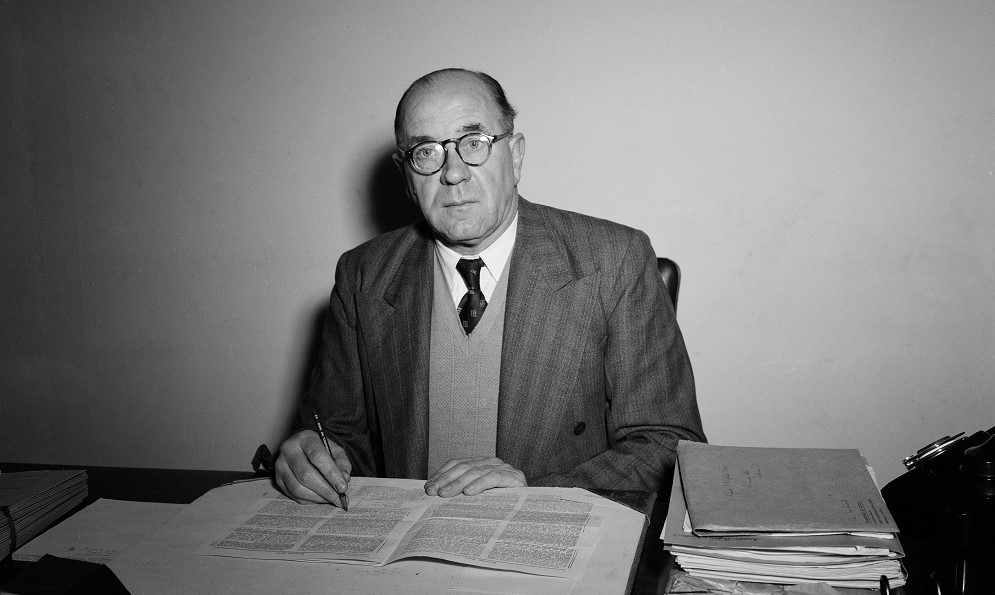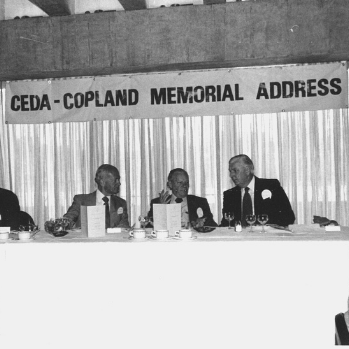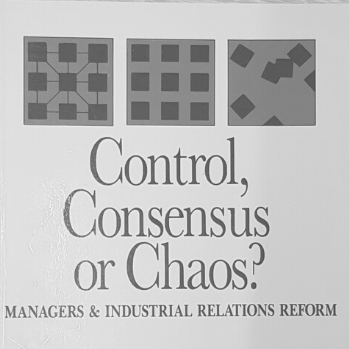PROGRESS 2050: Toward a prosperous future for all Australians
Formed in 1960 by one of Australia's foremost economists, Sir Douglas Copland, CEDA's purpose was to harness the ideas and influence of leading thinkers from business, government, community and academia.
The concept for CEDA was based on US think tank the Committee for Economic Development. The CED was formed in 1942 to deal with the problem of anticipated unemployment after World War II and was influential in shaping the Marshall Plan and the post-war monetary system. Today, the CED is part of CEDA's international network of counterparts.
From the start, CEDA was independent and not restricted by vested interests or political persuasion. Our purpose remains unchanged.

Today, CEDA continues to deliver leading thinking, informed discussion and rigorous research to influence good public policy for Australia's economic and social development. CEDA’s purpose is to achieve sustainable long-term prosperity for all Australians.
Since its inception, CEDA has produced more than 3000 publications, research reports and articles, highlighting emerging issues and directions in a diverse range of policy areas such as taxation, energy, industrial relations and healthcare.
In addition to research, the CEDA platform has attracted leading speakers from business, politics, government and academia. Every Prime Minister since the Hon. Bill McMahon has addressed CEDA, including Gough Whitlam, Malcolm Fraser, Bob Hawke, Paul Keating, John Howard, Kevin Rudd, Julia Gillard, Tony Abbott, Malcolm Turnbull, Scott Morrison, and Anthony Albanese.
CEDA's founder: Sir Douglas Berry Copland
CEDA's founder, Sir Douglas Copland, was a leading figure in the development and growth of the economics profession in Australia.
He led the creation of the famous Premiers' Plan - the document, admired by John Maynard Keynes among others, that set Australia's economic management during the Great Depression and made Copland a household name.
The inspiration for CEDA
Copland's ambitions for Australia led him to establish CEDA. He had previously shown his faith in an independent Australia in the 1930s, urging the Australian pound be separated from the British sterling.
.jpg)
In the 1950s, he famously voiced the fear that Australia was "a milk bar economy" - an economy set on consumption at the expense of capital goods and productive inputs. CEDA began as his attempt to set out a different economic future.
A distinguished career
Copland was one of the founders of economics as a university discipline in Australia, setting up two Australian university economics faculties.
From 1917 to 1920, he lectured in history and economics at the University of Tasmania and became Professor of Economics until 1934.
In 1934, Copland became the Sidney Myer Professor of Commerce and Dean of the faculty of Commerce at the University of Melbourne until 1944. From 1938 to 1945, he chaired the State Economic Committee for Victoria.
At the same time, he was appointed Commonwealth Prices Commissioner from 1939 to 1945. He held the Chair of Economics at Melbourne from 1944 to 1945, before becoming Australian Minister to China. In 1948, he became the founding Vice-Chancellor of the Australian National University.
He served several Australian governments, the United Nations and the world's peak labour organisation, and maintained a constant interest in business issues. One leading businessman dubbed him the "Keynes of the Commonwealth".
He was also Editor-in-Chief of Economic Record, the journal of the Economic Society of Australia and New Zealand, for 20 years. In 1961, he became the first Director-General of the International Institute for Labour Studies, a research body sponsored by the International Labour Organisation.
Dr Alex Millmow's paper, DB Copland and the Aftershocks of the Premiers' Plan 1931-1939, is available to download. Many thanks to Dr Millmow for making the paper available.
The Legacy of Sir Douglas Copland, Founder of CEDA
Released to coincide with our 50th anniversary, CEDA: Celebrating 50 Years, provides a unique portrait of the people and ideas that have shaped independent public policy in Australia.
Downloadable resources
The Legacy of Sir Douglas Copland, Founder of CEDA (PDF 2362KB)CEDA's Leaders
Sir Douglas Copland is the best-known figure in CEDA's history, but the organisation was shaped by a series of exceptional leaders and experts.
Peter Grey was the Chief Executive for 30 years and was a moving force in CEDA. Joining CEDA as director of research in the late 1960s, he led the organisation through the 1970s and 1980s, and into the 1990s.
In a speech to mark CEDA's 25th anniversary, the then Prime Minister, Bob Hawke, referred to "that quick mind, the generous spirit and the fascinating character which is Peter... Peter Grey has done us all a great service bringing together opinion makers, businessmen, academics, journalists, trade unionists and others in our community to debate the issues which have, and continue to be, important to our nation." Peter Grey retired in 1995.
Professor John Nieuwenhuysen first served CEDA as Research Director in the late 1980s before returning as Chief Executive in 1996. Professor Nieuwenhuysen dramatically expanded CEDA's joint research efforts with Australian universities on topics such as tax and industrial relations reform, bringing a new depth to CEDA's research publications.
CEDA's Research Directors have included Professor Neil Warren, now of the University of New South Wales, from 1988 to 1990. Professor Neville Norman, now of the University of Melbourne, was Economic Advisor from 1975 to 1992.
CEDA: Celebrating 50 Years
Released to coincide with our 50th anniversary, CEDA: Celebrating 50 Years, provides a unique portrait of the people and ideas that have shaped independent public policy in Australia.
Downloadable resources
CEDA: Celebrating 50 Years (PDF 2099KB)The History of CEDA
-
1960
-
1963
-
1970
-
1970
-
1976
-
1979
-
1982
-
1984
-
1985
-
1985
-
1995
-
2004
-
2010
-
2018




.png?lang=en-US&width=349&height=349&ext=.png)




.png?lang=en-US&width=349&height=349&ext=.png)



